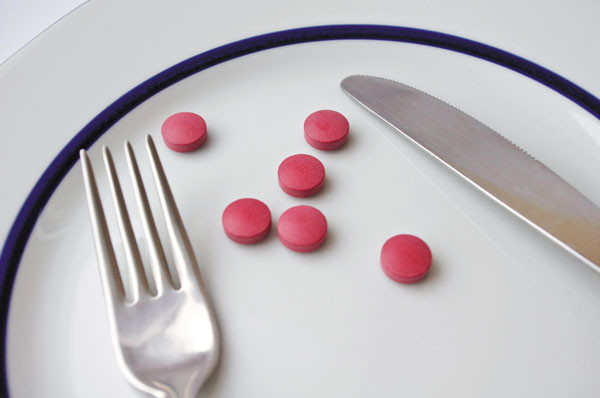
What are somatic workouts?

How to curb your stress eating

How to spot Parkinson’s disease symptoms

8 simple ways to reduce ultra-processed foods in your diet

Heart failure symptoms in women: How they’re different

GERD diet: Foods to avoid to reduce acid reflux

Strong is the new skinny

Everyday habits that sneakily weaken your bones

Don’t wait to get help for back pain

Correcting how you walk may ease osteoarthritis knee pain
Medications Archive
Articles
Is an “exercise pill” coming your way?
Researchers are developing pills that provide many of the effects of exercise. But none provides all the benefits of physical activity.
Image: Dmitry Fischer/ Thinkstock
Health experts are fond of saying, "If exercise were a pill, everyone would want to take it." And scientists seem to agree. Over the past several years there has been an accelerated push to develop drugs that mimic the effects of exercise. The promise is enormous—such medications could be a boon to people whose physical activity is limited by medical conditions or injuries. They could provide a head start for people who are beginning an exercise program. They could also confer the health benefits of exercise on healthy people who can't fit physical activity into their schedules or just don't want to get off the couch.
"While the idea of an exercise pill is a good one, it has many, many limitations," says Dr. Laurie Goodyear, head of the Section on Integrative Physiology and Metabolism at Harvard-affiliated Joslin Diabetes Center. Just as a vitamin capsule won't provide all the benefits of a healthy diet, a single pill is unlikely to provide all the benefits of exercise.
Is a heartburn drug hurting your health?
Long-term risks are associated with proton-pump inhibitors, but there are other options for treating acid reflux.
Image: Eranicle/ Thinkstock
Proton-pump inhibitors (PPIs), which reduce the amount of acid produced in the stomach, are so effective at treating heartburn and ulcers that they've been among the world's top-selling drugs for 25 years. Initially available only by prescription, PPIs, which include omeprazole (Prilosec), lansoprazole (Prevacid), and esomeprazole (Nexium), have been sold over the counter for several years. However, now that millions of people are taking PPIs, the drugs have been linked to an increasing number of health risks, such as fractures, kidney problems, vitamin B12 deficiency, low magnesium, and—most recently—dementia and heart attack.
"These studies—especially those suggesting a relationship to dementia and heart attack—are concerning," says Dr. Jacqueline Wolf, a gastroenterologist and associate professor of medicine at Harvard Medical School and author of A Woman's Guide to a Healthy Stomach: Taking Control of Your Digestive Health.
Can I take an expired medication?
Most drugs remain potent after their expiration dates. You may want to move it to the refrigerator, though, because drugs stored in cool temperatures usually remain potent longer.
Shunning osteoporosis treatment isn’t a wise decision for most women
Forgoing drugs that slow bone loss to avoid rare side effects can be the wrong decision for your hips and spine.
Image: wildpixel/Thinkstock
A front-page article in the June 1, 2016, edition of The New York Times carried this headline: "Fearing drugs' rare side effects, millions take their chances with osteoporosis." The article described a situation all too familiar to doctors. Women are declining prescriptions of bisphosphonates—drugs that slow the rate at which the body breaks down bone—or discontinuing the medications far earlier than recommended. In fact, according to a 2015 report in the Journal of Bone and Mineral Research, the rate of bisphosphonate use fell by half between 2008 and 2012. That article documented a wave of media coverage of scientific studies that reported two rare side effects—osteonecrosis (bone death) of the jaw and atypical fractures near the top of the femur (thigh-bone)—and suggested that the reports had kindled fears that had led women to abandon bisphosphonates.
"The perception of risk is so much greater than the actual risk," says Dr. Meryl LeBoff, director of the skeletal health and osteoporosis center at Harvard-affiliated Brigham and Women's Hospital. Compared with many other common diseases, we are fortunate that we have good therapies to reduce the risk of osteoporotic fractures by 70% at the spine and 40 to 50% at the hip. She points to statistics referenced in the New York Times article: for every 100,000 women taking a bisphosphonate, fewer than three will have osteonecrosis of the jaw and one will have an atypical femur fracture, but 2,000 will have avoided an osteoporotic fracture.
Are your medications causing nutrient deficiency?
Long-term doses of certain medications may rob you of calcium, folic acid, and crucial B vitamins.
Short-term medication use will not lead to nutrient deficiency. But long-term use may interfere with your body's ability to absorb nutrients or produce them.
Image: Gruzdaitis Andrius/Thinkstock
Medications are well known for causing side effects such as nausea or drowsiness. These are the kinds of side effects you notice and can do something about. But sometimes a lesser known side effect happens without giving you any warning: nutrient deficiency.
A warning about heartburn medications that contain aspirin
The FDA is warning that over-the-counter antacids with aspirin in them can cause stomach bleeding in rare cases.
Daily aspirin for disease prevention: When do the benefits outweigh the risks?
A daily aspirin may help defend against heart disease, but it should still be used with caution.
Image: FlairImages/Thinkstock
Aspirin tablets have been a staple of home medicine cabinets and first-aid kits for nearly 100 years. Long before that, people chewed willow tree bark, which contains aspirin-like compounds, to treat a variety of ailments. On top of being an excellent painkiller and fever reducer at its standard dosage, aspirin dramatically reduces the risks for a second heart attack and certain types of stroke when taken daily at a low (81-mg) dose. Research also suggests that aspirin might help limit the growth of colorectal cancer and possibly inhibit other cancers as well, but more research in this area is needed.
These benefits, coupled with the fact that aspirin is both cheap and relatively safe, have led the U.S. Preventive Services Task Force (USPSTF) to recommend that even some healthy people take a daily aspirin to ward off future disease. But figuring out exactly who is likely to benefit most from this therapy is a more complex calculation, says Dr. Michael Gaziano, a professor of medicine at Harvard Medical School and cardiologist at Brigham and Women's Hospital.
The cost of generic and name-brand drugs
More prescription medications now come in generic versions. But do you ever choose savings over quality?
Image: AlonsoAguilar /Thinkstock
Medication can be an unpredictable and costly expense. Whether it is short-term treatment or multiple drugs you take indefinitely, prescriptions can have a serious impact on your wallet.
Nowadays there are many generic versions of brand-name drugs that are often significantly less expensive. There are generic drugs to treat most common ailments, such as pain, high cholesterol, high blood pressure, diabetes, asthma, and depression.
Opioid drugs may not help with long-term low back pain
Opioid painkillers are commonly prescribed for chronic low back pain. However, a new study suggests that the drugs offer only modest, short-term relief, and should probably be used in conjunction with nondrug therapies or different drugs.
Anti-VEGF drugs may maintain vision of those with wet AMD
People with wet age-related macular degeneration (AMD) who took anti-VEGF injections were able to maintain their vision enough to legally drive or read small print, like the classified ads in newspapers, for five or more years.

What are somatic workouts?

How to curb your stress eating

How to spot Parkinson’s disease symptoms

8 simple ways to reduce ultra-processed foods in your diet

Heart failure symptoms in women: How they’re different

GERD diet: Foods to avoid to reduce acid reflux

Strong is the new skinny

Everyday habits that sneakily weaken your bones

Don’t wait to get help for back pain

Correcting how you walk may ease osteoarthritis knee pain
Free Healthbeat Signup
Get the latest in health news delivered to your inbox!
Sign Up









